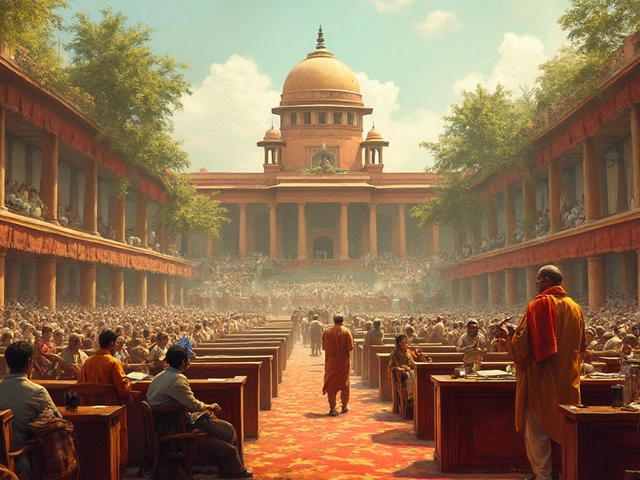
Which Government Service Has the Highest Salary?
Ever catch yourself scrolling through job posts, wondering if any government gig actually pays really well? You’re not alone. Most folks know about government stability and perks, but when it comes to high salaries, the details aren’t always clear.
If you’re aiming for a government job that’ll make your friends jealous on payday, you’ll want to know which services top the chart. We’re talking about job roles where monthly pay can beat some private sector packages, plus a long list of benefits.
Let’s break down salary numbers, look at the real perks, and see what it actually takes to bag one of these premium posts. No confusing jargon or secret codes—just honest info that’ll help you make your game plan.
- Top-Paying Government Services in India
- Perks and Benefits Beyond the Paycheck
- How to Qualify for High-Salary Government Jobs
- Real Talk: Challenges and Tips for Prep
Top-Paying Government Services in India
Everyone hears stories about cushy government jobs, but not all government jobs are created equal—especially when it comes to salary. There are a handful of services where monthly paychecks seriously stand out. If you’re chasing big numbers, here are the ones you can’t ignore.
First up is the Indian Administrative Service (IAS). This one is kind of a legend. Freshers start at a basic pay of about ₹56,100 per month—but the real jump comes with promotions. Top-level IAS officers (Chief Secretaries or Cabinet Secretaries) take home a basic of ₹2,50,000 each month, not counting a fat stack of allowances.
Then you’ve got the Indian Foreign Service (IFS). Folks here get similar pay scales to IAS, but get additional benefits when posted abroad. Allowances can swell their salaries to triple or quadruple the Indian base salary.
Don't forget the Indian Police Service (IPS), which mirrors the IAS pay scale. Posting in bigger cities or tough assignments can mean higher added perks like risk and dearness allowances.
On the technical side, PSUs (Public Sector Undertakings) like ONGC, BHEL, or Indian Oil also pay big bucks—sometimes starting above ₹60,000 per month for engineers, plus performance bonuses. These jobs may not have the same power as IAS or IPS, but the money’s real.
Check out how the top government jobs compare:
| Service | Starting Basic Pay | Top-End Pay | Extra Perks |
|---|---|---|---|
| IAS | ₹56,100 | ₹2,50,000+ | House, travel, security, official car |
| IPS | ₹56,100 | ₹2,50,000+ | House, travel, risk allowance |
| IFS | ₹56,100 | ₹2,50,000+ | Huge foreign allowances, housing |
| PSU (e.g., ONGC, IOCL) | ₹60,000 | ₹2,40,000+ | Bonuses, free medical, housing |
So, if you want the biggest government paycheck, aim for one of these. Government jobs like these also mean extra perks—think free housing, medical care, travel allowances, and more. The catch? The selection process is tough, but the pay-off is worth it if you crack it.
Perks and Benefits Beyond the Paycheck
If you think a government job’s draw is just the salary, there’s way more going on behind the scenes. The real kicker with top government jobs is the extra perks – and sometimes they’re worth more than the monthly pay itself.
Take the Indian Administrative Service (IAS), Indian Foreign Service (IFS), or Indian Revenue Service (IRS) for example. These roles are known for their high earnings, but it’s the benefits package that really makes them sought-after. Here’s what comes with the territory:
- House Allowance or Quarters: Many top posts come with either a spacious government house or a big chunk of money as rent allowance. For example, senior IAS and IFS officers usually get prime government accommodation in posh localities.
- Official Vehicle and Driver: Mid and senior level officers get a government vehicle—sometimes more than one—and a driver, so you almost never deal with traffic or public transport.
- Medical Benefits: Government jobs cover you and your family’s medical bills at top hospitals. For example, the Central Government Health Scheme (CGHS) takes care of most hospital expenses, which can save lakhs every year.
- Travel Allowance: Free or heavily discounted tickets when you travel for work or personal reasons. Even railway and airfare can be covered, depending on your post.
- Pension and Job Security: The pension after retirement is a huge plus, with extra allowances for years of service. No fear of sudden layoffs either — job security is as solid as it gets.
- Telephone and Utility Bills: Top officers often get a fixed allowance every month for phone, water, and electricity bills, which can add up to a good savings chunk over time.
- Education of Children: Some services help pay for your kids’ education or give special quotas in top schools.
Check out this snapshot showing what major benefits can look like for an IAS officer at the Joint Secretary level in Delhi:
| Benefit | Approximate Value per Year (INR) |
|---|---|
| Official Residence | ₹6,00,000 |
| Vehicle + Fuel | ₹2,50,000 |
| Medical (CGHS) | ₹1,00,000 |
| Telephone Bill Allowance | ₹40,000 |
| Children's Education Allowance | ₹27,000 |
| Travel Concessions | ₹1,00,000 |
Perks vary across services and ranks, but if you grab one of the best-paying jobs, the benefits add up to a total package way higher than the take-home salary alone. Think about the money you’ll save when housing, healthcare, and schooling are all sorted without stress. That’s the real reason these jobs have fierce competition.

How to Qualify for High-Salary Government Jobs
If you’re serious about landing a top-paying government post, you’ll need to tick off a few key boxes. The highest-paid roles, like IAS, IFS, IPS, or Group A PSU jobs, all have tough entry requirements and a mad level of competition. No shortcuts here—just a clear plan and hard work.
The eligibility starts with your education. Most high-salary government jobs expect at least a bachelor’s degree. For posts like Indian Administrative Service (IAS), Indian Police Service (IPS), or Indian Foreign Service (IFS), you’ll need to crack the UPSC Civil Services Exam, which is known everywhere as one of the toughest exams in India. For high-paying Public Sector Unit (PSU) jobs, you’ll often need a degree in engineering or management, and sometimes a good GATE score or a top rank in their separate vacancy exams.
Here’s how the main gatekeeper exams stack up for these high-salary jobs:
| Job Role | Main Exam | Success Rate |
|---|---|---|
| IAS/IPS/IFS | UPSC CSE | Less than 1% |
| PSU (like ONGC, NTPC, BHEL) | GATE / Company Exam | About 2-10% (varies by unit) |
| RBI Grade B | RBI Grade B Exam | About 0.2–1% |
The government jobs that pay the most don’t just want academic toppers. You’ll need grit, consistency, and skills in problem-solving, communication, and quick thinking. A quick guide on how to prep smart:
- Know the Exam Pattern: Go through the latest syllabus and past year papers. Don’t skip updates—these exams change patterns often.
- Pick the Right Resources: Select one or two top-tier books for each subject rather than drowning in material. NCERT books work wonders for basics.
- Practice, Practice, Practice: Mock tests are your best friend. Weekly or even daily mocks help train your brain for speed and accuracy.
- Don’t Ignore Interviews: The final round in exams like UPSC or RBI is the interview. Work on speaking clearly and confidently—join a mock interview group if you can.
- Play the Long Game: Most toppers take at least 1-2 years for serious prep. Set daily goals so you’re not burning out.
Another fact: in 2024, over 13 lakh candidates applied for UPSC Civil Services, but just around 1000 will get selected for all services combined. So, to up your odds, start early and stay steady. Little habits, like making notes and revising regularly, really do add up over time. If you stick it out and cover your bases, you’ll give yourself the best shot at those premium government paychecks.
Real Talk: Challenges and Tips for Prep
The hype is real: landing those top government jobs isn’t just hard—it’s seriously cutthroat. For the most-wanted services like IAS, IPS, and IFS, less than 1% of applicants make it through. Each year, nearly 9 lakh candidates fill out the UPSC form, and barely a thousand get a top seat. You need more than just book smarts to be in that group.
The daily grind is tough. On average, serious candidates prep for 8-10 hours a day, and many keep at it for up to two years (yep, years). It’s not just about covering the UPSC syllabus; you’ve got to write essays, handle current affairs, ace interviews, and deal with the mental stress. Plus, there’s a lot of pressure from friends, family, and your own expectations.
| Exam | Total Applicants (2024) | Final Selections |
|---|---|---|
| UPSC Civil Services | ~8,80,000 | 1,100 |
| IFS (Indian Foreign Service) | ~8,80,000 | 20-30 |
| RBI Grade B | ~3,00,000 | 300 |
So what works? Getting help is big. Joining an offline or online coaching class can make a huge difference, especially if you’re new to these exams. But don’t just follow the crowd—mock tests and regular self-assessment matter even more. Here’s how you can keep things practical:
- Stick to a smart study plan. Focus on key parts of the syllabus where most questions come from.
- Build a daily habit of reading newspapers or smart news apps. Current affairs are at least 30% of the marks, especially for government jobs.
- Practice writing answers under time pressure. Many lose marks because they know the content but can’t write fast or clear enough in the real exam.
- Don’t forget about mental health. Take breaks, hang out with friends, and don’t burn out before the main event.
If you want an edge, talk to people already in the job, and ask for real prep experiences, not just the usual tips. Most toppers had their own tricks, whether it was early morning studies, group discussions, or watching YouTube crash courses. It’s not a one-size-fits-all journey—find what actually works for you, and stick to it.






Write a comment